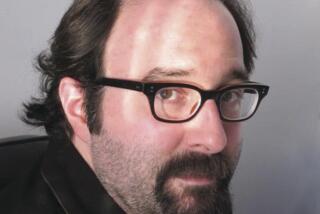Forgotten, but mostly deservedly
- Share via
The ‘80s in Hollywood might officially be remembered as the age of Steven Spielberg and John Hughes, but there are plenty of people out there who’ll say that their fondest movie memories involve lounging in their den with friends and relations, watching some halfhearted plugger like the 1987 Jon Cryer teen comedy “Morgan Stewart’s Coming Home.”
Looking to service precisely that audience, Lionsgate on Tuesday issues a new DVD series called “The Lost Collection: The Best Movies You Totally Forgot About,” an eight-title set that includes a slew of films released between 1984 and 1990. In addition to “Morgan Stewart,” the lineup includes another Cryer vehicle, “Hiding Out”; the Drew Barrymore-starrer “Irreconcilable Differences”; a cheapo slasher pic, “Slaughter High”; and the teen-monster romp “My Best Friend Is a Vampire.” There’s also an early Keanu Reeves comedy, “The Night Before”; the Leslie Nielsen horror parody “Repossessed”; and a Jim Belushi-Whoopi Goldberg road picture, “Homer & Eddie.”
None of these movies is exactly a classic, although a few have merit. “Morgan Stewart’s Coming Home” is a sweet coming-of-age story, graced by a charismatic Cryer performance and some nicely observed details about his character’s horror movie fandom. “The Night Before” is worth watching just to see Reeves playing a straightforward romantic lead in a movie that that has him piecing together the details of the most disastrous prom night ever in flashback.
The most accomplished film in this group is “Irreconcilable Differences,” an early effort by the writing-directing team of Nancy Meyers and Charles Shyer; it’s a slick look at how one couple grow apart once their career dreams start coming true and how that affects their precocious young daughter (Barrymore).
The rest of “The Lost Collection,” however, ranges from mediocre to outright bad. It’s hard to imagine a more despicable torture than forcing someone to watch “Homer & Eddie,” in which Goldberg plays a criminally insane fugitive and Belushi plays a mildly mentally challenged good soul. You couldn’t write a parody of the film that would be more ungainly than the original.
The set does pose an interesting question, though -- whether “the ‘80s movie” is a genre all its own, like film noir or the western. If so, what are its parameters? Is it just about moussed-up hair and synthesizer-driven soundtracks? Or is there something else that still satisfies when people rewatch these movies made 20 years ago?
Maybe it’s that the stakes are so low -- even in the high-school-nerd-gets-revenge schlocker “Slaughter High.” There might be a residual slob-versus-snob element left over from the “Animal House” era, but whether it’s a gawky senator’s son who just wants to get George Romero’s autograph in “Morgan Stewart’s” or a suburban teen virgin who gets bitten by the ultimate sexual predator in “My Best Friend Is a Vampire,” even the slobs here are fairly well off.
Nobody in this group of ‘80s movies is in danger of having their lives shaken up in any significant, permanent way. Even when Reeves’ character wakes up with low-grade amnesia in “the bad part” of Los Angeles in “The Night Before,” he’s in a well-lighted, cartoonish inner city, where everyone dresses like they’re auditioning for a part in a music video.
Though the ‘80s were suffused with Cold War anxiety and simmering racial tension, Hollywood movies tended to shy away from those topics, except as drivers for comedy or action. Movie buffs with idiosyncratic tastes or strong political leanings had to latch on to characters like Cryer’s yuppie stockbroker in “Hiding Out,” who turns his back on Wall Street after ratting out a mob boss and takes cover in a suburban high school. He’s in a desperate situation, but he never wants for anything. Plus, he looks and acts so cool.
Yes, it’s preposterous that we live in a world where “Hiding Out” is on DVD and “The Magnificent Ambersons” isn’t. It’s preposterous but not inexplicable. The movies in “The Lost Collection” are relics of the video store age, with a built-in audience of people who’ll see the title and the cover and remember -- rightly or wrongly -- a simpler, less economically stressful time, when little girls could afford to hire lawyers to straighten out their dysfunctional families.
The synthetic rhythms, angular fashions and neon colors that define ‘80s style aren’t just signifiers of an increasingly distant past; they also offer a kind of instant comfort. These movies are plastic, phony, unthreatening. They’re a cinematic version of that family den. They’re remembered fondly because they’re so harmless.
Except for “Homer & Eddie,” of course.
--
More to Read
Only good movies
Get the Indie Focus newsletter, Mark Olsen's weekly guide to the world of cinema.
You may occasionally receive promotional content from the Los Angeles Times.










